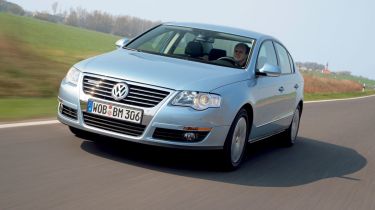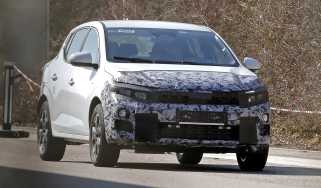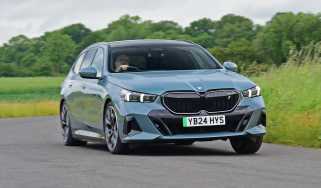Volkswagen Passat
The Bluemotion offers big savings in fuel economy and reduced emissions over previous models

VW is to be applauded for its Bluemotion range, and the Passat, as with the Polo before it, is another excellent example of pushing current technology as far as possible. With eco concerns ever rising, it offers big savings in economy and carbon dioxide emissions over the standard car, but doesn’t require the driving experience to be compromised. It must be pointed out, though, that the higher price needs to be carefully considered against the efficiency benefits. However, with other VW models – such as the Golf – set to benefit from the technology, we can only see a bright future for Bluemotion.
When it comes to being eco-friendly, green isn’t the colour that first springs to mind at Volkswagen – it’s blue! That is because the manufacturer’s engineers have a special name for their range of low-emission, low-fuel consumption cars.
The Bluemotion line-up was launched with the Polo last year, which we drove in Issue 921. Emitting a mere 103g/km of CO2 and returning 72mpg, it certainly impressed us – so can the Passat Bluemotion do the same?
As with its smaller stablemate, the car has been designed to be as clean and efficient as possible. And although the visual differences amount to simply a sleeker grille, body-coloured bumpers and a boot badge, underneath the skin many changes have been made.
Engineers have tweaked the familiar diesel particulate filter-equipped 105bhp 1.9-litre four-cylinder TDI unit, reducing its idle speed and optimising its management system in the search for better economy. They have also modified the transmission, lengthening third, fourth and fifth gears and installing a new light on the dashboard which tells the driver when is the most econ-omical point to shift.
And while the Passat’s body is already a pretty slippery shape, it has had some aerodynamic updates, too. Underneath, the brake discs and rear suspension components have been covered, while the whole car has been lowered 15mm at the front and 8mm at the rear, allowing it to cut through the air more cleanly.
Add to this Continental Premium Contact tyres that are running at 6psi higher than standard, and fuel consumption is greatly reduced.
Combined economy jumps 5mpg to 55.4mpg, giving a maximum range of 851 miles – which means you could drive from London to Monte Carlo on only one fill-up of the 70-litre tank. The car is very clean, too. Carbon dioxide emissions fall 15g/km to 136g/km, which drops the Passat’s company car tax band from 19 per cent to 15 per cent.
On the move, there’s little difference between the Bluemotion and the regular model. Even with the lengthened ratios, the engine’s 250Nm of torque provides plenty of overtaking urge. And thanks to that higher fifth gear, motorway cruising is even more refined. The aerodynamic changes have increased the top speed by 3mph to 120mph, which makes the Bluemotion feel super-capable over long distances. Around corners and on uneven road surfaces, the Passat steers and rides comfortably, yet it’s not much fun to drive.
Bluemotion prices haven’t yet been confirmed, but expect to pay another £750, taking the cost for a regular Passat 1.9 TDI to around £17,000. For high-mileage business drivers, the newcomer will undoubtedly be a big hit, but private buyers will have to do their sums to ensure it makes sense.







